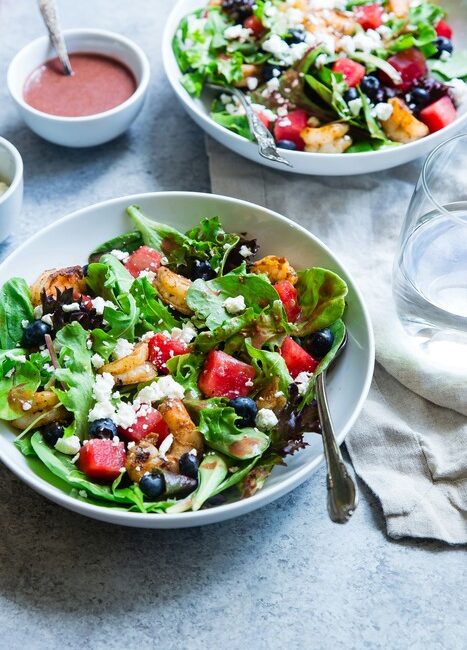We’ve all been there. You made a huge bowl of your favorite salad, thinking you’d get through it in a couple of days, but now you’re staring at the leftovers wondering, Can you freeze salads? It seems like a great way to save food from going bad, but let’s face it, salad doesn’t exactly scream “freezer-friendly.” Still, the question lingers: Can you freeze salads and still have them taste fresh and crisp later?
In this article, we’re diving into the nitty-gritty of freezing salads, from which ones work best to how you can freeze them properly. Spoiler alert: It’s not always as simple as sticking your salad bowl in the freezer! We’ll cover some basic dos and don’ts, explore a few recipes that are freezer-friendly, and give you tips on how to bring those greens back to life when they come out of cold storage.
Can You Freeze Salads? (And Should You?)
Let’s get right to the question of the hour: Can you freeze salads? The answer is, well, it depends. Not all salads are created equal. Some freeze beautifully, while others, like a delicate lettuce-based Caesar salad, might end up as a soggy mess.
The type of salad you want to freeze is key. The main rule of thumb is to avoid freezing anything with high water content. Lettuce, cucumber, and tomatoes, for example, don’t freeze well because they tend to turn into mush when thawed. However, certain salads can be frozen successfully if you follow a few simple steps.
Which Salads Can You Freeze?
- Pasta Salads – These are freezer champs! Pasta holds up well in the freezer as long as it’s cooked al dente. Be sure to separate out any veggies or dressings that might not freeze well.
- Grain Salads – Think quinoa, couscous, or farro-based salads. These can be frozen easily and reheated without losing much of their texture. Again, add fresh vegetables or dressing after thawing for the best result.
- Coleslaw (Without Mayo) – If you skip the mayo and use a vinegar-based dressing instead, coleslaw can actually freeze quite well. It will maintain its crunch and flavor after thawing.
- Bean Salads – Chickpeas, black beans, and lentils freeze well and maintain their structure when defrosted. These types of salads are hearty and satisfying, making them perfect for freezing.
- Chicken Salad – Chicken salad can be stored in the refrigerator for up to three days. If you need to keep it longer than that, it can be frozen for up to two months
How to Freeze Salads the Right Way
So, can you freeze salads? Yes, but you’ve got to be smart about how you do it. Here’s a step-by-step guide to ensure your frozen salad experience is a success:
- Choose the Right Salad: As mentioned earlier, opt for grain-based or sturdy salads that won’t fall apart after freezing.
- Portion It Out: Instead of freezing the entire bowl, divide your salad into individual portions. This will help with thawing and reduce waste.
- Leave Dressings Out: Dressings, especially creamy ones, don’t freeze well. Keep them separate and add them after thawing your salad.
- Use Proper Containers: Airtight containers or freezer-safe bags are essential. Be sure to remove as much air as possible to prevent freezer burn.
- Label and Date: Always label your containers with the date so you know how long they’ve been in the freezer. Most salads can be frozen for up to 3 months.
- Thawing: Let your salad thaw in the fridge overnight for the best results. Never try to speed up the process by microwaving—it will ruin the texture.
Suggested Freezer-Friendly Salad Recipes
Here are a few recipes that are perfect for freezing. They’ll hold up well, and with a few fresh ingredients added after thawing, they’ll taste like they were made fresh!
1. Freezer-Friendly Quinoa Salad
Ingredients:
- 2 cups cooked quinoa
- 1 cup chickpeas
- 1/2 cup chopped bell peppers
- 1/4 cup chopped red onion
- 2 tbsp olive oil
- Salt and pepper to taste
Instructions:
- Mix cooked quinoa, chickpeas, bell peppers, and red onion in a large bowl.
- Divide into freezer-safe containers.
- When ready to eat, thaw overnight in the fridge and drizzle with olive oil before serving.
2. Bean and Corn Salad
Ingredients:
- 1 can black beans, drained
- 1 can corn, drained
- 1/2 red onion, chopped
- 1/4 cup cilantro, chopped
- Juice of 1 lime
- Salt to taste
Instructions:
- Combine black beans, corn, red onion, and cilantro in a large bowl.
- Freeze in portioned containers.
- Once thawed, add lime juice and salt before serving.
3. Greek Couscous Salad
Ingredients:
- 2 cups cooked couscous
- 1/2 cup feta cheese
- 1/4 cup Kalamata olives
- 1/2 cup chopped cucumbers (add fresh after thawing)
- 1 tbsp olive oil
- Oregano to taste
Instructions:
- Mix the couscous, feta, and olives in a bowl.
- Freeze in airtight containers.
- Add chopped cucumbers and olive oil after thawing for a fresh, crunchy texture.
FAQ: Can You Freeze Salads?
Q: Can you freeze lettuce salads?
A: Unfortunately, no. Lettuce becomes soggy and limp when frozen and thawed. Stick to heartier greens like kale or cabbage if you want to freeze.
Q: Can you freeze salad dressing?
A: Oil-based dressings freeze better than creamy ones. Creamy dressings tend to separate and become unappetizing when thawed.
Q: How long can you freeze salads?
A: Most salads can be frozen for up to 3 months, though grain-based salads may last a little longer.
Q: Can you freeze fruit salads?
A: You can, but the texture will change. Berries and melons will become mushy. It’s best to freeze fruits individually and add them fresh after thawing.
Q: Should I freeze my salad ingredients separately?
A: Yes, freezing ingredients separately (especially veggies and dressing) helps maintain texture and flavor when you’re ready to assemble your salad.
Final Thoughts
So, can you freeze salads? Absolutely, but with a few caveats. Avoid freezing delicate greens or water-rich veggies like cucumbers and tomatoes. Stick to hearty salads made with grains, beans, or sturdy vegetables, and always separate the dressing for best results. With the right technique, you can enjoy a delicious, crisp salad straight from the freezer. Happy freezing!



